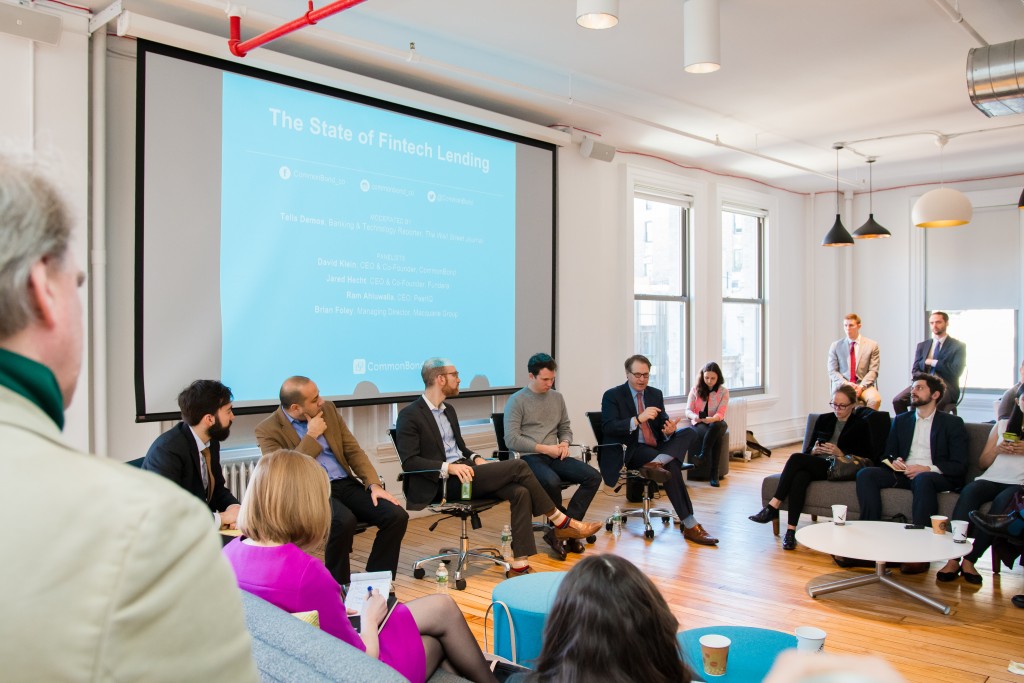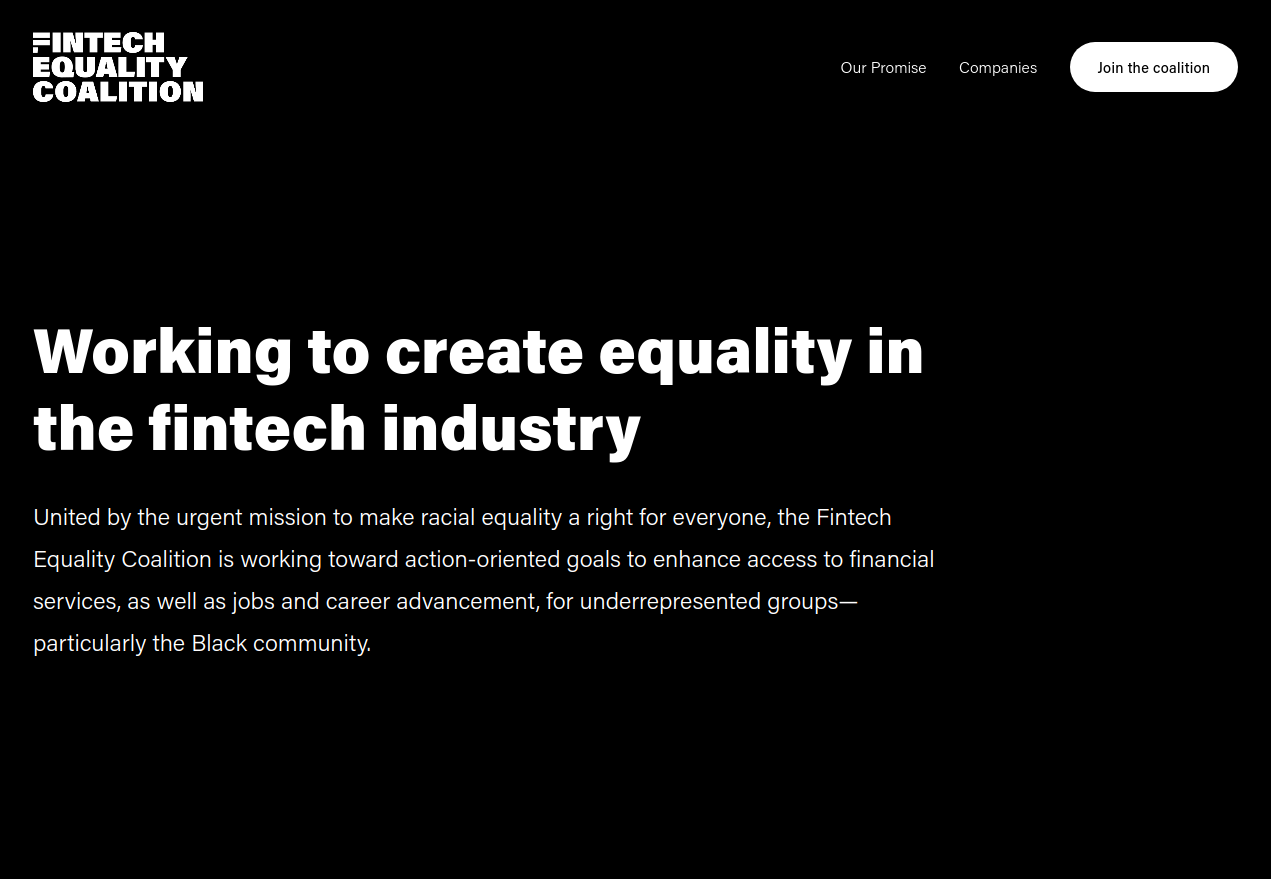Related Headlines
| 02/02/2022 | CommonBond expands into Solar Financing |
| 04/01/2019 | CommonBond now targets med/dental students |
| 02/14/2019 | CommonBond gets major lending boost |
| 01/17/2019 | CommonBond lays off 18% of staff |
| 12/04/2018 | CommonBond Acquires NextGenVest |
Stories
Commonbond Receives Financing From Major Banks
February 14, 2019 Commonbond announced today that it has signed $750 million in lending capacity from Goldman Sachs, Citibank, Barclays, BMO, and ING.
Commonbond announced today that it has signed $750 million in lending capacity from Goldman Sachs, Citibank, Barclays, BMO, and ING.
“From the start, we have set out to build the highest levels of trust with our customers and our capital partners,” said CommonBond CEO and co-founder David Klein. “Access to this level of capital, and at a lower cost, is a testament to the platform we’ve built, the quality of our members, and the success of our capital markets program. We’re thrilled to have some of the world’s top banks recognize [this], and work with us in a way that ultimately benefits the consumer.”
This new financing will support growth for Commonbond, which provides student loans and student loan refinancing. According to a company statement today, in addition to growth, the new lending capacity reflects significantly lower cost of capital for CommonBond, improving the company’s borrowing spreads and advance rates.
This financing comes a little less than a month after Reuters reported that Commonbond laid off 18% of its staff, which affected 22 people. Based in New York and founded in 2013, Commonbond has originated over $2.5 billion in loans.
CommonBond Issues Securitization
August 3, 2018 CommonBond, which helps people finance student loans, announced today its second AAA-rated securitization from Moody’s and DBRS. At $292 million of total collateral, the transaction is the company’s largest to date. It is CommonBond’s second securitization of 2018 and its seventh altogether. The company, which competes with SoFi, now has a total securitized loan amount to over $1.5 billion.
CommonBond, which helps people finance student loans, announced today its second AAA-rated securitization from Moody’s and DBRS. At $292 million of total collateral, the transaction is the company’s largest to date. It is CommonBond’s second securitization of 2018 and its seventh altogether. The company, which competes with SoFi, now has a total securitized loan amount to over $1.5 billion.
A mix of new and current investors participated in the transaction. Goldman Sachs served as structuring agent, co-lead manager, book-runner, and co-sponsor for this securitization. Barclays, Citi, and Guggenheim Securities also were co-lead managers and book-runners on the transaction.
“Our recent securitization continues the company’s track record of strong credit performance and consistent growth,” said Sam Luk, head of capital markets at CommonBond.
CommonBond was founded in 2011 and is based in New York.
CommonBond Closes $248 Million Securitization, Secures Inaugural S&P Rating of AA
October 27, 2017NEW YORK (October 27, 2017) – CommonBond, a leading financial technology company that helps students and graduates pay for higher education, today announces the close of a $248 million securitization of refinanced student loans. The offering’s most senior notes achieved AA ratings from Moody’s, S&P, and DBRS – Aa2, AA, and AA (high), respectively – the company’s highest ratings to date.
The transaction was CommonBond’s fifth and largest to date. Investors submitted $1 billion in orders, making the deal more than four times oversubscribed. Goldman Sachs served as structuring agent, co-lead manager, book-runner, and co-sponsor. Barclays and Citi also served as co-lead managers and book-runners on the transaction, while Guggenheim Securities served as co-manager.
“Investor demand for CommonBond paper has never been greater,” said David Klein, CommonBond CEO and co-founder. “The strong market reception is a reflection of our pristine credit quality, continued ratings progression, and track record of consistent results.” Klein added, “As a programmatic issuer, we look forward to continuing to bring consistently high performing bonds to the market, providing investors with world-class capital deployment options.”
The transaction was the first of CommonBond’s to be rated by S&P, who assigned AA ratings to the transaction, alongside similar ratings from Moody’s and DBRS. Moody’s and DBRS also recently upgraded CommonBond’s ratings on previous deals in recognition of the company’s strong credit performance.
The securitization marks a significant period of growth for CommonBond, which earlier this year introduced student loans for current undergraduate and graduate students nationwide, to complement its established student loan refinance product. CommonBond is the only financial technology company to offer a full suite of student loan solutions, including new student loans to current students and refinanced student loans to graduates. The company has funded over $1 billion in student loans, and continues to grow its enterprise platform, CommonBond for Business™ – which enables employers to contribute a monthly payment to employees’ student loans, in addition to offering an evaluation tool for employees to determine their best repayment options.
About CommonBond
CommonBond is a financial technology company on a mission to give students and graduates more transparent, simple, and affordable ways to pay for higher education. The company offers refinance loans to college graduates, new loans to current students, and a suite of student loan repayment benefits to employees through its CommonBond for Business™ program. By designing a better student loan experience that combines advanced technology with competitive rates and award-winning customer service, CommonBond has funded over $1 billion in loans for its tens of thousands of members. CommonBond is also the first and only finance company with a “one-for-one” social mission: for every loan it funds, CommonBond also funds the education of a child in need, through its partnership with Pencils of Promise. For more information, visit www.commonbond.co.
CommonBond Securitizes Refinanced Student Loans Worth $168 Million
October 20, 2016Online lender for student loans, CommonBond closed a $168 million securitization, backed by $178 million in collateral with an ‘A1’ rating from Moody’s and ‘AA’ from DBRS.
This is the company’s second deal this year, after a $150 million transaction, earlier in April.
Founded by Wharton graduates David Klein, Michael Taormina, and Jessup Shean in 2012, CommonBond set out to address the need for affordable graduate student loan options. So far, the company has crossed $500 million in funded loans and provides MBA loans, personal loans and refinances student loans . The New York-based lender uses data and technology to underwrite its loans, holding half on its balance sheet and selling the other half though a marketplace. In July this year, it also raised $30 million in equity, $300 million in debt and acquired a personal finance startup, Gradible.
“CommonBond has built a sterling reputation in the capital markets due to our meticulous, data-driven underwriting,” said Morgan Edwards, Chief Financial Officer of CommonBond. “We continue to be excited to see new investors participate with each transaction we bring to the market and expect to see the diversity of investors increase with subsequent deals,” he said in a statement.
CommonBond competes with the likes of SoFi, which recently securitized bonds worth $427 million, its third deal this year. And like SoFi, which started off with student loans before moving to personal loans and mortgages, CommonBond also wants a larger share of the pie. “Our long term vision is to provide our customers with their evolving needs and we are well positioned to provide other products and services over time,” CEO David Klein told deBanked earlier.
Barclays and Goldman Sachs served as joint-lead managers and bookrunners on the transaction.
CommonBond Raises Equity, Debt and Acquires Personal Finance Startup, Gradible
July 19, 2016
Did someone say trouble in (online lending) paradise?
CommonBond has raised $30 million in equity, $300 million in debt and acquired a personal finance startup, Gradible.
The New York-based online student loan lender that specializes in higher education loans raised $30 million in series C equity round from new investor Neuberger Berman along with existing investors August Capital, Tribeca Venture Partners, Social Capital, Nyca Partners and Victory Park Capital. Individual investors in the round included finance veterans like former Citigroup CEO Vikram Pandit, former Thomson Reuters CEO Tom Glocer and former Barclays Private Wealth CEO Tom Kalaris.
The company plans to use the funds towards hiring folks in finance, sales and technology, building new technology platforms and scaling its loan operations. Founded by Wharton graduates David Klein, Michael Taormina, and Jessup Shean in 2012, CommonBond started as many startups do, with a founder’s problem of lack of affordable graduate student loan options. Today the company has crossed $500 million in funded loans and provides MBA loans, refinances student loans and offers personal loans.
Non-bank student loan providers make up just a sliver of the market, says CEO David Klein. “Over 99.99 percent of the student loan market is driven by the federal government and private banks and the the tiny piece of the market is made up by CommonBond and SoFi,” he said. “And as big as that sounds, relative to the largesse of the market, we don’t even make up a percent of that.”
The Gradible acquisition should answer some of that for CommonBond, giving it access to 40 million students and a network of employers. It plans to build a portal for employers who can contribute directly to their employees’ monthly student loan payments, through a student loan contribution platform similar to a 401(k) matching program.
CommonBond competes with rivals like SoFi which has made news for everything from being offensive, offering dating services, selling mortgages and its purported plans to become a bank. And CommonBond isn’t shying away from other loan products either. “Our long term vision is to provide our customers with their evolving needs and we are well positioned to provide other products and services over time.”
In terms of its lending operations, CommonBond uses a hybrid model of funding by holding half of the originated loans on its balance sheet and selling the other half on a marketplace. “To weather any storm, it’s important to diversify capital sources and we think the hybrid model will end up being the only option,” Klein said.
Fintech Equality Coalition: meet disparity in minority PPP funding
September 9, 2020 Last month, a group of fintech companies christened the Fintech Equality Coalition. Dedicated to ensuring racial equality is a right extended to everyone, the group pledges to focus on enhancing access to financial services for the underrepresented- particularly within the black community.
Last month, a group of fintech companies christened the Fintech Equality Coalition. Dedicated to ensuring racial equality is a right extended to everyone, the group pledges to focus on enhancing access to financial services for the underrepresented- particularly within the black community.
The coalition comes at a pivotal time for fintech, currently facing the challenges created by the 2020 pandemic.
In August, the Federal Reserve Bank of New York released a study into the distribution of PPP and how the funds affected black communities. The institution found that the number of small business owners fell by 22% from February to April- the largest drop on record. But the closure of businesses was not felt equally.
“Black businesses experienced the most acute decline, with a 41 percent drop,” The study said. “Latinx business owners fell by 32 percent, and Asian business owners dropped by 26 percent. In contrast, the number of white business owners fell by 17 percent.”
The study also showed that forty percent of Black-owned businesses are concentrated in 30 counties across the country. 19 out of 30 of these counties were the hardest hit by COVID 19 in the nation.
Unfortunately, other studies have shown that the PPP did not accurately get funds to areas hit by the virus. The National Bureau of Economic Research (NBER) published in July, found that companies more negatively affected by COVID were less likely to be approved.
This may explain why the Small Business Majority study into PPP found that while 63% of Black and Latino small business owners applied, less than two-thirds received funding.
The Fintech Equality Coaltion’s pledge is overall a promise to do more for minority communities, stating:
- Because the Black community is underserved by financial services
- Because there are Black voices and issues in our industry that should be but are not currently amplified
- Because Black employees and Black-owned businesses are underrepresented in the tech community, including at many of our companies
- Because the Black community is underrepresented in leadership roles, including at many of our companies
- Because these promises are meaningless without accountability
The coalition is a pledge to host and sponsor events like forums that feature black speakers. The pledge is also a recognition that the black community has been underserved by financial services in the past, and the signers aim to incorporate more black-owned businesses than before.
Who’s signed
Where Fintech Ranks on the Inc 5000 List for 2020
August 12, 2020Here’s where fintech and online lending rank on the Inc 5000 list for 2020:
| Ranking | Company Name | Growth |
| 30 | Ocrolus | 7,919% |
| 46 | Yieldstreet | 6,103% |
| 351 | Direct Funding Now | 1,297% |
| 402 | GROUNDFLOOR | 1,141% |
| 486 | LoanPaymentPro | 946% |
| 534 | LendingPoint | 862% |
| 539 | OppLoans | 860% |
| 566 | dv01 | 830% |
| 647 | Fund That Flip | 724% |
| 1031 | Fundera | 449% |
| 1035 | Nav | 447% |
| 1053 | Fundrise | 442% |
| 1103 | Bitcoin Depot | 409% |
| 1229 | Smart Business Funding | 365% |
| 1282 | Global Lending Services | 349% |
| 1360 | CommonBond | 327% |
| 1392 | Forward Financing | 319% |
| 1398 | Fundation Group | 318% |
| 1502 | Fountainhead Commercial Capital | 293% |
| 1736 | Seek Capital | 246% |
| 1746 | PIRS Capital | 244% |
| 1776 | Braviant Holdings | 240% |
| 1933 | Choice Merchant Solutions | 218% |
| 2001 | Fundomate | 212% |
| 2257 | Lighter Capital | 185% |
| 2466 | Bankers Healthcare Group | 167% |
| 2501 | Fund&Grow | 165% |
| 2537 | Central Diligence Group | 162% |
| 2761 | Lendtek | 145% |
| 3062 | Shore Funding Solutions | 127% |
| 3400 | Biz2Credit | 110% |
| 3575 | National Funding | 103% |
| 4344 | Yalber & Got Capital | 76% |
| 4509 | Expansion Capital Group | 70% |
Marketplace Lending Association Members Take Steps To Help Borrowers During The Coronavirus Crisis
March 17, 2020 Members of the Marketplace Lending Association are taking steps to alleviate financial pressure facing borrowers during the recent crisis.
Members of the Marketplace Lending Association are taking steps to alleviate financial pressure facing borrowers during the recent crisis.
“This includes providing impacted borrowers with forbearance, loan extensions, and other repayment flexibility that is typically provided to borrowers impacted by natural disasters. During the time of payment forbearance, marketplace lenders are also electing not to report borrowers as ‘late on payment’ to the credit bureaus,” a letter to senior members of Congress signed by Exec Director Nathaniel Hoopes states. “Members are also waiving any late fees for borrowers in forbearance due to the COVID-19 pandemic, posting helplines on company homepages, and communicating options via company servicing portals.”
Members of the MLA include:
- Affirm
- Avant
- Funding Circle
- LendingClub
- Marlette Funding
- Prosper
- SoFi
- Upstart
- College Ave Student Loans
- Commonbond
- LendingPoint
- PeerStreet
- Yieldstreet
- Arcadia Funds, LLC
- Citadel SPV
- Colchis Capital
- Community Investment Management
- cross river
- dv01
- eOriginal
- Equifax
- experian
- Fintech Credit Innovations Inc.
- FutureFuel
- Laurel road
- LendIt
- pwc
- Scratch
- SouthEast bank
- TransUnion
- tuition.io
- VantageScore
- Victory Park Capital
- WebBank



































































